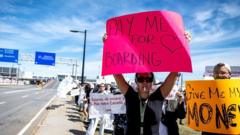The striking workers, who are involved in the production of F-15 fighter jets and other military aircraft, voted against Boeing's recent proposal, citing concerns over compensation, pension, and work schedules. The walkout, orchestrated by a local branch of the International Association of Machinists and Aerospace Workers (IAM), has raised questions about Boeing's labor relations and ongoing recovery efforts.
The strike marks the first since 1996 in Boeing’s defense sector, underscoring rising tensions as the company grapples with its legacy of safety incidents and production issues. IAM officials stated, “3,200 highly-skilled IAM Union members at Boeing went on strike at midnight because enough is enough. This is about respect and dignity, not empty promises.” Boeing management expressed disappointment in the decision, with Vice President Dan Gillian noting that the last offer included an average wage increase of 40%.
Boeing’s Chief Executive Kelly Ortberg downplayed the strike's significance, predicting manageable impacts compared to the prior year’s massive strike involving passenger jet workers—an event that drastically affected finances. As the company continues to navigate fallout from previous crashes and production setbacks—such as a notable decline in aircraft deliveries—this latest strike could either represent a minor disruption or signal deeper issues within its labor relations.
As IAM represents around 600,000 workers across several industries, the outcome of this strike may influence broader labor movements in the aerospace sector and reflect shifting attitudes towards corporate practices amidst ongoing negotiations for better working conditions.
The strike marks the first since 1996 in Boeing’s defense sector, underscoring rising tensions as the company grapples with its legacy of safety incidents and production issues. IAM officials stated, “3,200 highly-skilled IAM Union members at Boeing went on strike at midnight because enough is enough. This is about respect and dignity, not empty promises.” Boeing management expressed disappointment in the decision, with Vice President Dan Gillian noting that the last offer included an average wage increase of 40%.
Boeing’s Chief Executive Kelly Ortberg downplayed the strike's significance, predicting manageable impacts compared to the prior year’s massive strike involving passenger jet workers—an event that drastically affected finances. As the company continues to navigate fallout from previous crashes and production setbacks—such as a notable decline in aircraft deliveries—this latest strike could either represent a minor disruption or signal deeper issues within its labor relations.
As IAM represents around 600,000 workers across several industries, the outcome of this strike may influence broader labor movements in the aerospace sector and reflect shifting attitudes towards corporate practices amidst ongoing negotiations for better working conditions.



















